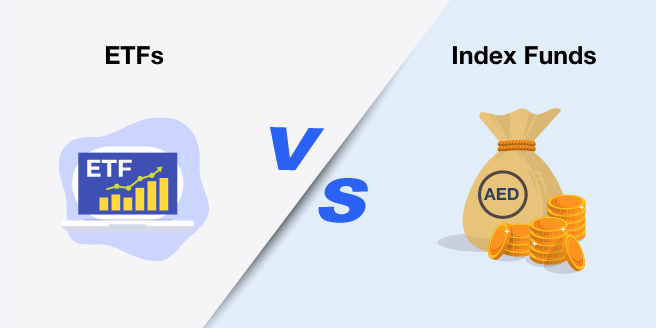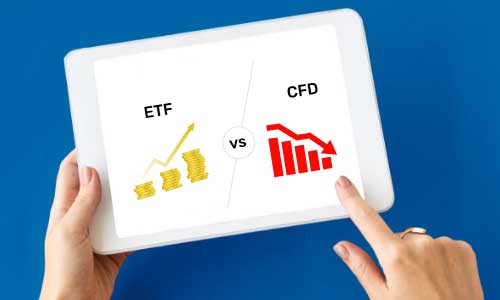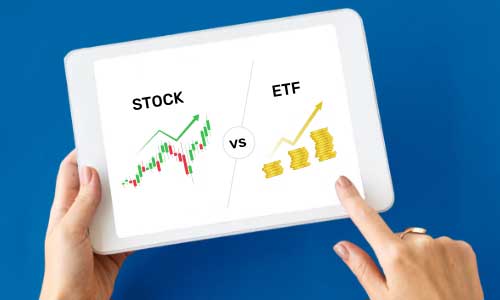ETFs vs Index Funds: Understanding the Key Differences
In today’s fast-paced world, many among us struggle to find the time to actively manage our investments. As a result, passive investment strategies have gained popularity, allowing professional fund managers to handle the buying and selling on our behalf.
What is the Difference Between ETF and Index Fund?
ETFs are traded like stocks throughout the day and can offer higher returns, though they come with increased risk. In contrast, index funds provide a more stable investment option, typically trading through asset management companies.
As the financial market evolves, both index funds and ETFs present valuable opportunities for portfolio expansion. However, there are significant differences in costs, tax implications, and trading opportunities between the two.
This article will explore what are ETFs and Index Funds, which one is better, and more. We will also guide you to find the option that best aligns with your financial goals.
Best Investment Plans in UAE
Some of the best Investment quotes in UAE & Dubai are:
What are Index Funds?
Index funds invest in a diversified portfolio of securities, including stocks, bonds, and commodities. They typically track popular indices like NIFTY 50 or SENSEX 100.
| Factbox 💡 |
|---|
|
Across the world, some of the most popular indices include —
|
These funds aim to maintain alignment with its benchmark, regardless of market fluctuations.
Index funds are gaining popularity as a convenient passive investment option, offering the potential for long-term wealth creation and good returns. They allow you to benefit from the growth potential of the market while minimising risk.
Characteristics of Index Funds:
- Availability: You can invest in them through mutual funds or ETFs
- Investment Options: Both growth and dividend options are available, allowing you to match your risk appetite
- Professional Management: Fund managers handle trades, aiming to minimise losses and maximise profits
Tracking: The primary aim of index funds is to allocate investment amount to stocks or securities as per the underlying index composition
What are ETFs?
Exchange-Traded Funds (ETFs) are funds that let you invest in stocks, metals, or any sector. They allow you to put your money into a basket of securities in a single transaction.
These funds are managed either actively or passively managed and can track a wide range of assets, including equities, bonds, currencies, and commodities.
ETFs are known for their transparency, as you can see exactly where your money is allocated.
Characteristics of ETFs:
- Lower Expense Ratios: Generally, ETFs have lower management fees but may incur higher trading costs
- Dividend Income: You can earn dividends based on ETF performance, which can be reinvested
- Market Dependency: The value of ETFs is significantly influenced by market liquidity —
- Portfolio Transparency: You receive daily updates on your investment portfolios
- Flexible Trading: ETFs are traded in the stock market in real time, which makes it easier to buy and sell them whenever you want
| What are Index ETFs? |
|---|
|
Index ETFs are a part of ETFs that started trading in the early 1990s in the U.S. They belong to a broader category of index funds, which also includes passively managed mutual funds. Index ETFs track the performance of specific market indices, just like index mutual funds, but they have some extra benefits.
|
Key Differences Between ETF and Index Fund
Having understood the basics of the two types, let’s jump to our main discussion on index mutual fund vs ETF and see what makes them different —
| Particulars | ETFs | Index Funds |
|---|---|---|
| Is DEMAT Account Mandatory? |
✅ |
❌ |
| Expense Ratio |
Low |
Higher than ETFs |
| SIP Investment |
❌ |
✅ |
| Management Styles |
Both passive and active management options |
Predominantly passive management |
| Liquidity |
Flexible trading options — can be actively managed |
Depends on whether you invest via ETF or mutual fund (lower flexibility in trading with the latter) |
| Valuation< |
May change continuously throughout the trading day |
Valued once daily at market close (under mutual funds) |
| Trading Flexibility |
Buy and sell throughout the day at current market prices |
Limited to end-of-day trading (under mutual funds) |
| Redemption Process |
Buy and sell ETFs on the secondary market at market prices |
Redeem index funds through the fund house at the closing NAV |
| Research Requirement |
May require extensive analysis for non-index ETFs |
Minimal/Easier for non-experts |
| Risk Profile |
May involve higher risk with potential for higher returns |
Generally lower risk due to diversification |
| Returns |
Can outperform or underperform the market |
Matches market returns |
ETFs vs Index funds — Which are better?
When deciding between index mutual fund vs ETF, it’s advisable to consider your trading habits and investment goals —
Consider an Index Mutual Fund if
- If you invest frequently: No-load index mutual funds can be cost-effective as they allow you to enjoy the benefit of cost-averaging
- If you want to spend lower annual operating expenses: As ETFs are traded on the market, you can save on their operating expenses by investing in index mutual funds
- If you are a beginner: While starting your investment journey, you can turn to index funds for good returns without too much risk
Consider an ETF if
- If you're looking for niche exposure: ETFs can provide targeted investments in particular industries or commodities that may not be available through index mutual funds
For instance, in India, you can find ETFs that let you invest in gold, silver, and so on. - If you trade actively: Unlike mutual funds, ETFs allow for intraday trading, stop orders, limit orders, options, and short selling
Ultimately, the choice between Index ETF vs Index funds depends on your investment goals, trading preferences, and overall financial strategy.
Are you looking for the best index funds in India? Explore different types of Index fund categories for smart investing!
SIP Calculator for ETFs vs Index Fund
What Index Funds and ETFs Have in Common?
Index funds and ETFs, both quite popular among investors, share a few similarities.
ETFs are funds that let you invest in stocks, indices, metals, and more. Index funds, on the other hand, are simply funds that track a particular index — you can invest in such funds via mutual funds and ETFs.
Both instruments give you the chance to build a well-diversified portfolio. Moreover, with the top options from the leading companies, you can actually enjoy high long-term returns.
Key Takeaways
- Index funds and ETFs are favoured for their ease of investing, diversification, and more.
- ETFs trade like stocks throughout the day. Index funds are priced once daily.
- With respect to ETFs vs Index funds: ETFs generally have lower expense ratios, while index funds may have lower minimum investments.
- Index funds follow a passive management style — ETFs can be either passive or active.
- ETFs provide greater liquidity, while index funds have a more rigid redemption process.
Frequently Asked Questions
1. Do ETFs or Index Funds Have Better Returns?
ETFs and index funds typically offer similar returns when they track the same index. Differences in returns usually stem from factors such as tracking errors, expenses, and how dividends are handled.
2. Why would I buy an index fund over an ETF?
You might choose an index mutual fund over an ETF if you prefer to invest regularly and enjoy cost averaging. Additionally, some options under the former may have lower costs compared to similar ETFs.
3. Are ETFs or Index Funds Safer?
ETFs and index funds offer similar safety levels, especially when tracking broad market indexes. Their main advantage is diversification, which reduces risk compared to owning individual stocks.
4. Are Index Funds Better Than Stocks?
Index funds enable investors to match market returns with minimal research, making them ideal for those without extensive investment knowledge. In contrast, individual stocks may yield higher returns but come with greater risk and require thorough analysis.
More From Investment
- Recent Articles
- Popular Articles





















